Asia 2270, Spring 2020: Mao's View on International Politics Essay
VerifiedAdded on 2022/08/17
|7
|1879
|16
Essay
AI Summary
This essay provides an in-depth analysis of Mao Zedong's perspective on international politics and its enduring influence on China's political landscape. The paper examines key concepts such as the Three Worlds Theory, authoritarian capitalism, and the single-party system, highlighting their origins in Mao's revolutionary ideas. It explores how these ideologies, despite their contradictions, have shaped China's diplomatic strategies and international relations, even in the 21st century. The essay also discusses the impact of Mao's ideas on the geographical reformulation of international relations and his role in China's transition from militant rule to an authoritarian capitalist approach. The conclusion emphasizes Mao's lasting legacy and his significant contributions to the restructuring of both China's political landscape and the global order.
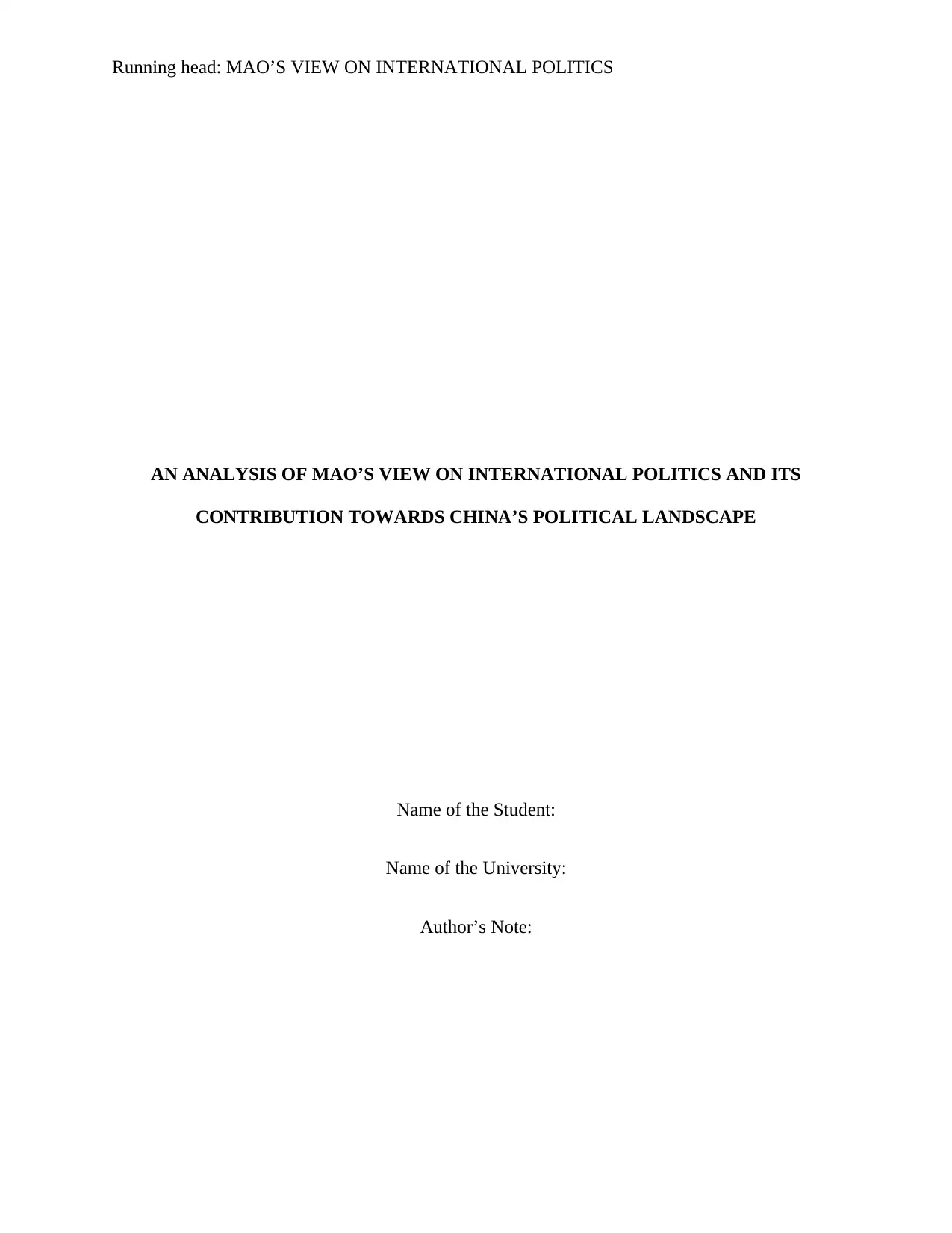
Running head: MAO’S VIEW ON INTERNATIONAL POLITICS
AN ANALYSIS OF MAO’S VIEW ON INTERNATIONAL POLITICS AND ITS
CONTRIBUTION TOWARDS CHINA’S POLITICAL LANDSCAPE
Name of the Student:
Name of the University:
Author’s Note:
AN ANALYSIS OF MAO’S VIEW ON INTERNATIONAL POLITICS AND ITS
CONTRIBUTION TOWARDS CHINA’S POLITICAL LANDSCAPE
Name of the Student:
Name of the University:
Author’s Note:
Paraphrase This Document
Need a fresh take? Get an instant paraphrase of this document with our AI Paraphraser
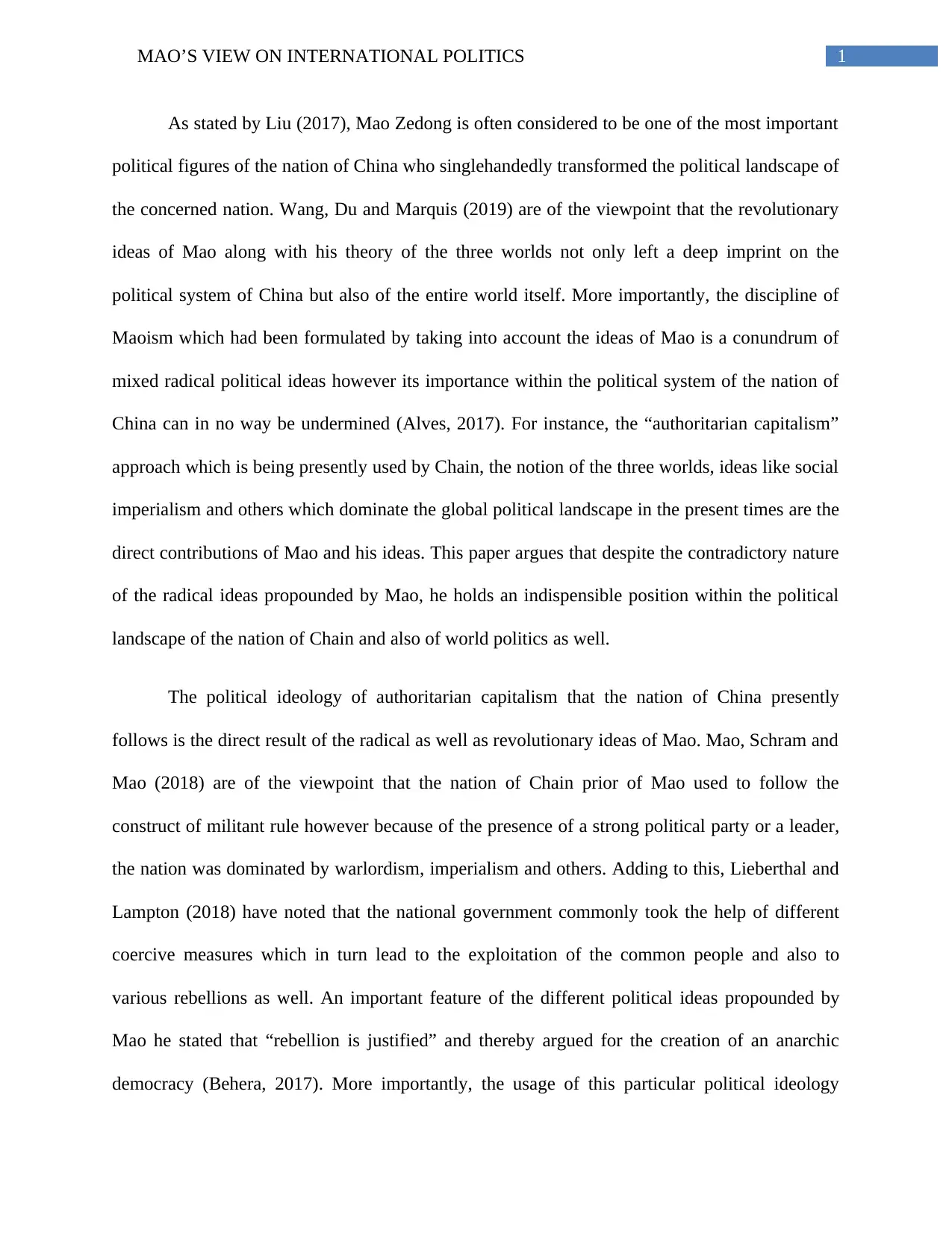
1MAO’S VIEW ON INTERNATIONAL POLITICS
As stated by Liu (2017), Mao Zedong is often considered to be one of the most important
political figures of the nation of China who singlehandedly transformed the political landscape of
the concerned nation. Wang, Du and Marquis (2019) are of the viewpoint that the revolutionary
ideas of Mao along with his theory of the three worlds not only left a deep imprint on the
political system of China but also of the entire world itself. More importantly, the discipline of
Maoism which had been formulated by taking into account the ideas of Mao is a conundrum of
mixed radical political ideas however its importance within the political system of the nation of
China can in no way be undermined (Alves, 2017). For instance, the “authoritarian capitalism”
approach which is being presently used by Chain, the notion of the three worlds, ideas like social
imperialism and others which dominate the global political landscape in the present times are the
direct contributions of Mao and his ideas. This paper argues that despite the contradictory nature
of the radical ideas propounded by Mao, he holds an indispensible position within the political
landscape of the nation of Chain and also of world politics as well.
The political ideology of authoritarian capitalism that the nation of China presently
follows is the direct result of the radical as well as revolutionary ideas of Mao. Mao, Schram and
Mao (2018) are of the viewpoint that the nation of Chain prior of Mao used to follow the
construct of militant rule however because of the presence of a strong political party or a leader,
the nation was dominated by warlordism, imperialism and others. Adding to this, Lieberthal and
Lampton (2018) have noted that the national government commonly took the help of different
coercive measures which in turn lead to the exploitation of the common people and also to
various rebellions as well. An important feature of the different political ideas propounded by
Mao he stated that “rebellion is justified” and thereby argued for the creation of an anarchic
democracy (Behera, 2017). More importantly, the usage of this particular political ideology
As stated by Liu (2017), Mao Zedong is often considered to be one of the most important
political figures of the nation of China who singlehandedly transformed the political landscape of
the concerned nation. Wang, Du and Marquis (2019) are of the viewpoint that the revolutionary
ideas of Mao along with his theory of the three worlds not only left a deep imprint on the
political system of China but also of the entire world itself. More importantly, the discipline of
Maoism which had been formulated by taking into account the ideas of Mao is a conundrum of
mixed radical political ideas however its importance within the political system of the nation of
China can in no way be undermined (Alves, 2017). For instance, the “authoritarian capitalism”
approach which is being presently used by Chain, the notion of the three worlds, ideas like social
imperialism and others which dominate the global political landscape in the present times are the
direct contributions of Mao and his ideas. This paper argues that despite the contradictory nature
of the radical ideas propounded by Mao, he holds an indispensible position within the political
landscape of the nation of Chain and also of world politics as well.
The political ideology of authoritarian capitalism that the nation of China presently
follows is the direct result of the radical as well as revolutionary ideas of Mao. Mao, Schram and
Mao (2018) are of the viewpoint that the nation of Chain prior of Mao used to follow the
construct of militant rule however because of the presence of a strong political party or a leader,
the nation was dominated by warlordism, imperialism and others. Adding to this, Lieberthal and
Lampton (2018) have noted that the national government commonly took the help of different
coercive measures which in turn lead to the exploitation of the common people and also to
various rebellions as well. An important feature of the different political ideas propounded by
Mao he stated that “rebellion is justified” and thereby argued for the creation of an anarchic
democracy (Behera, 2017). More importantly, the usage of this particular political ideology
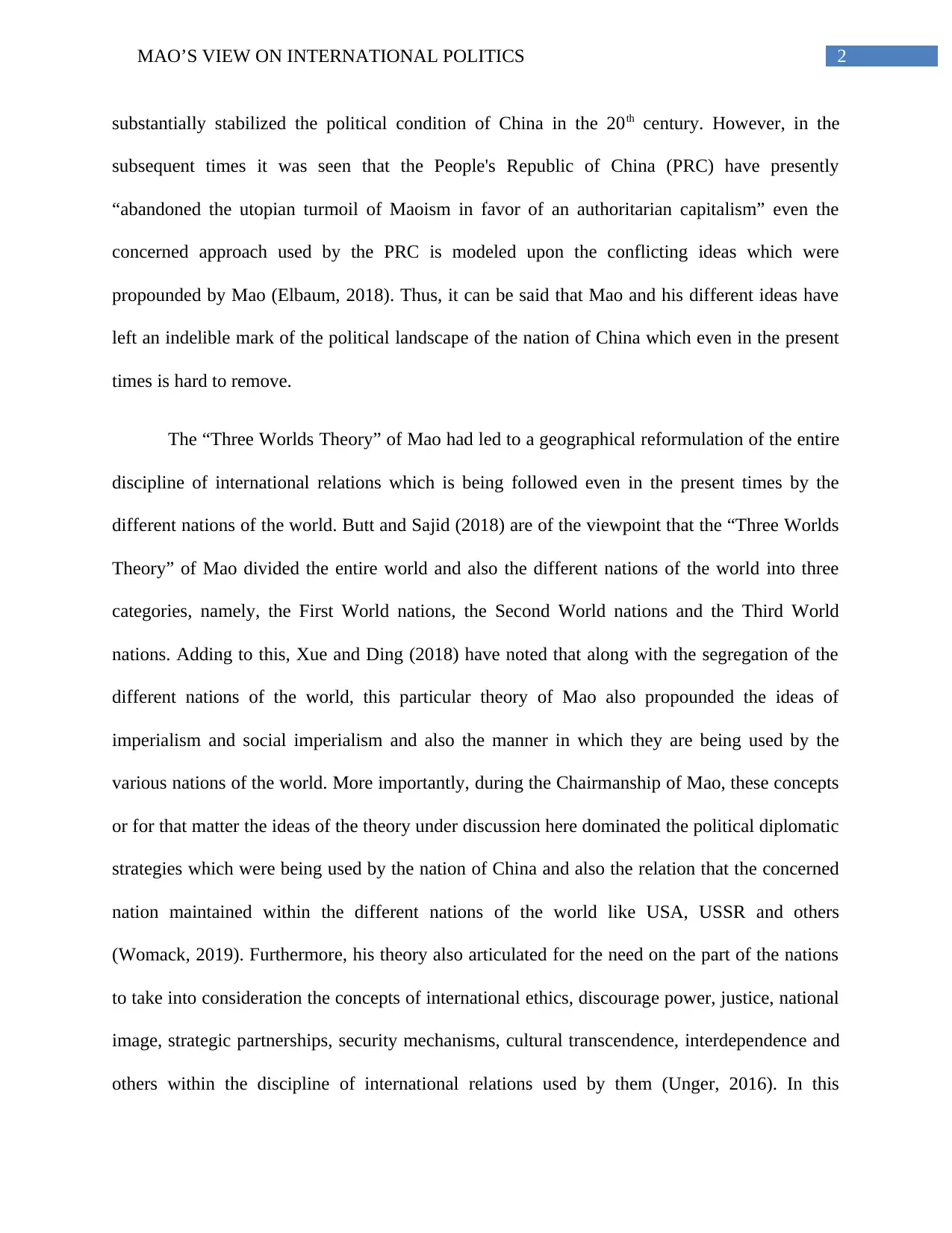
2MAO’S VIEW ON INTERNATIONAL POLITICS
substantially stabilized the political condition of China in the 20th century. However, in the
subsequent times it was seen that the People's Republic of China (PRC) have presently
“abandoned the utopian turmoil of Maoism in favor of an authoritarian capitalism” even the
concerned approach used by the PRC is modeled upon the conflicting ideas which were
propounded by Mao (Elbaum, 2018). Thus, it can be said that Mao and his different ideas have
left an indelible mark of the political landscape of the nation of China which even in the present
times is hard to remove.
The “Three Worlds Theory” of Mao had led to a geographical reformulation of the entire
discipline of international relations which is being followed even in the present times by the
different nations of the world. Butt and Sajid (2018) are of the viewpoint that the “Three Worlds
Theory” of Mao divided the entire world and also the different nations of the world into three
categories, namely, the First World nations, the Second World nations and the Third World
nations. Adding to this, Xue and Ding (2018) have noted that along with the segregation of the
different nations of the world, this particular theory of Mao also propounded the ideas of
imperialism and social imperialism and also the manner in which they are being used by the
various nations of the world. More importantly, during the Chairmanship of Mao, these concepts
or for that matter the ideas of the theory under discussion here dominated the political diplomatic
strategies which were being used by the nation of China and also the relation that the concerned
nation maintained within the different nations of the world like USA, USSR and others
(Womack, 2019). Furthermore, his theory also articulated for the need on the part of the nations
to take into consideration the concepts of international ethics, discourage power, justice, national
image, strategic partnerships, security mechanisms, cultural transcendence, interdependence and
others within the discipline of international relations used by them (Unger, 2016). In this
substantially stabilized the political condition of China in the 20th century. However, in the
subsequent times it was seen that the People's Republic of China (PRC) have presently
“abandoned the utopian turmoil of Maoism in favor of an authoritarian capitalism” even the
concerned approach used by the PRC is modeled upon the conflicting ideas which were
propounded by Mao (Elbaum, 2018). Thus, it can be said that Mao and his different ideas have
left an indelible mark of the political landscape of the nation of China which even in the present
times is hard to remove.
The “Three Worlds Theory” of Mao had led to a geographical reformulation of the entire
discipline of international relations which is being followed even in the present times by the
different nations of the world. Butt and Sajid (2018) are of the viewpoint that the “Three Worlds
Theory” of Mao divided the entire world and also the different nations of the world into three
categories, namely, the First World nations, the Second World nations and the Third World
nations. Adding to this, Xue and Ding (2018) have noted that along with the segregation of the
different nations of the world, this particular theory of Mao also propounded the ideas of
imperialism and social imperialism and also the manner in which they are being used by the
various nations of the world. More importantly, during the Chairmanship of Mao, these concepts
or for that matter the ideas of the theory under discussion here dominated the political diplomatic
strategies which were being used by the nation of China and also the relation that the concerned
nation maintained within the different nations of the world like USA, USSR and others
(Womack, 2019). Furthermore, his theory also articulated for the need on the part of the nations
to take into consideration the concepts of international ethics, discourage power, justice, national
image, strategic partnerships, security mechanisms, cultural transcendence, interdependence and
others within the discipline of international relations used by them (Unger, 2016). In this
⊘ This is a preview!⊘
Do you want full access?
Subscribe today to unlock all pages.

Trusted by 1+ million students worldwide
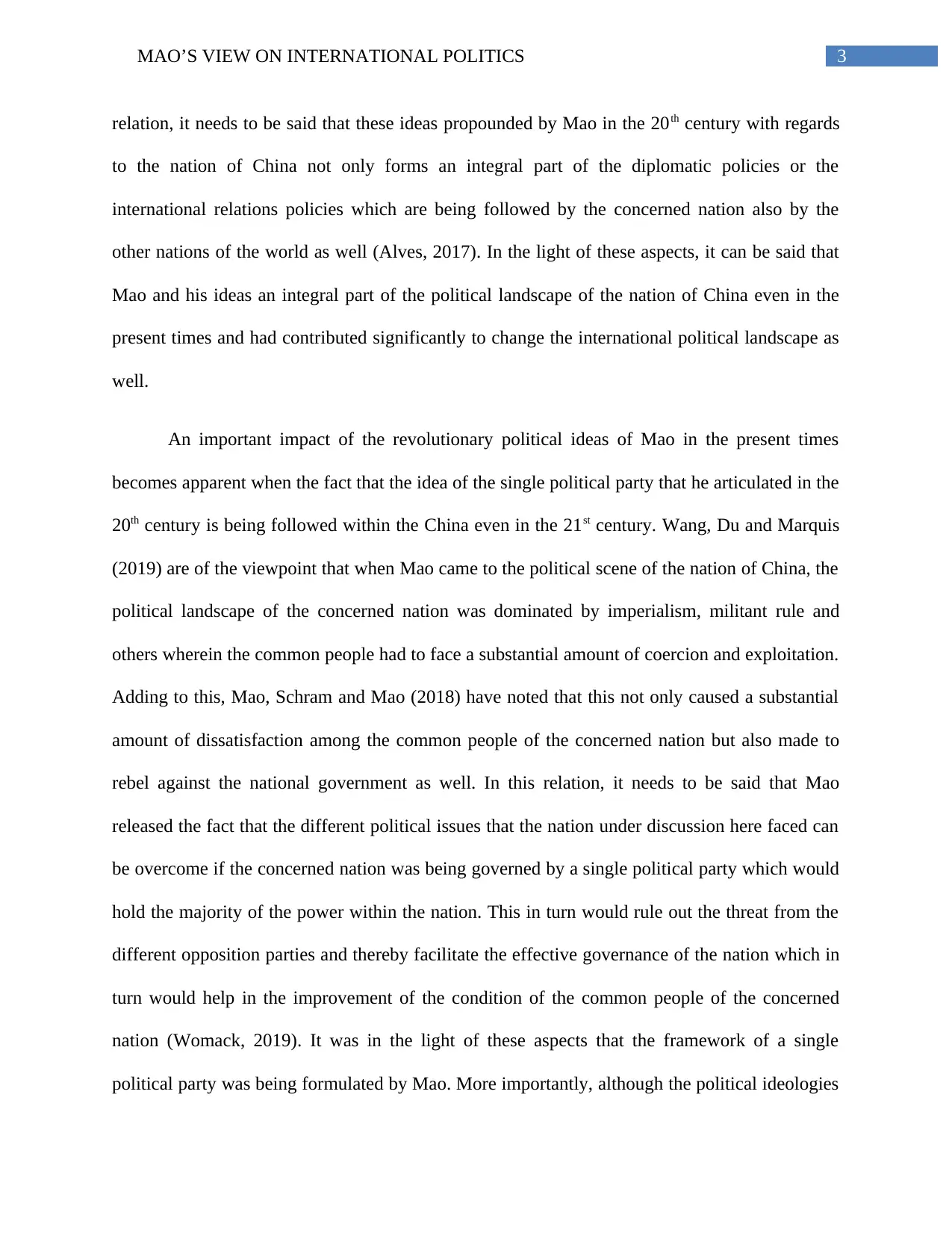
3MAO’S VIEW ON INTERNATIONAL POLITICS
relation, it needs to be said that these ideas propounded by Mao in the 20th century with regards
to the nation of China not only forms an integral part of the diplomatic policies or the
international relations policies which are being followed by the concerned nation also by the
other nations of the world as well (Alves, 2017). In the light of these aspects, it can be said that
Mao and his ideas an integral part of the political landscape of the nation of China even in the
present times and had contributed significantly to change the international political landscape as
well.
An important impact of the revolutionary political ideas of Mao in the present times
becomes apparent when the fact that the idea of the single political party that he articulated in the
20th century is being followed within the China even in the 21st century. Wang, Du and Marquis
(2019) are of the viewpoint that when Mao came to the political scene of the nation of China, the
political landscape of the concerned nation was dominated by imperialism, militant rule and
others wherein the common people had to face a substantial amount of coercion and exploitation.
Adding to this, Mao, Schram and Mao (2018) have noted that this not only caused a substantial
amount of dissatisfaction among the common people of the concerned nation but also made to
rebel against the national government as well. In this relation, it needs to be said that Mao
released the fact that the different political issues that the nation under discussion here faced can
be overcome if the concerned nation was being governed by a single political party which would
hold the majority of the power within the nation. This in turn would rule out the threat from the
different opposition parties and thereby facilitate the effective governance of the nation which in
turn would help in the improvement of the condition of the common people of the concerned
nation (Womack, 2019). It was in the light of these aspects that the framework of a single
political party was being formulated by Mao. More importantly, although the political ideologies
relation, it needs to be said that these ideas propounded by Mao in the 20th century with regards
to the nation of China not only forms an integral part of the diplomatic policies or the
international relations policies which are being followed by the concerned nation also by the
other nations of the world as well (Alves, 2017). In the light of these aspects, it can be said that
Mao and his ideas an integral part of the political landscape of the nation of China even in the
present times and had contributed significantly to change the international political landscape as
well.
An important impact of the revolutionary political ideas of Mao in the present times
becomes apparent when the fact that the idea of the single political party that he articulated in the
20th century is being followed within the China even in the 21st century. Wang, Du and Marquis
(2019) are of the viewpoint that when Mao came to the political scene of the nation of China, the
political landscape of the concerned nation was dominated by imperialism, militant rule and
others wherein the common people had to face a substantial amount of coercion and exploitation.
Adding to this, Mao, Schram and Mao (2018) have noted that this not only caused a substantial
amount of dissatisfaction among the common people of the concerned nation but also made to
rebel against the national government as well. In this relation, it needs to be said that Mao
released the fact that the different political issues that the nation under discussion here faced can
be overcome if the concerned nation was being governed by a single political party which would
hold the majority of the power within the nation. This in turn would rule out the threat from the
different opposition parties and thereby facilitate the effective governance of the nation which in
turn would help in the improvement of the condition of the common people of the concerned
nation (Womack, 2019). It was in the light of these aspects that the framework of a single
political party was being formulated by Mao. More importantly, although the political ideologies
Paraphrase This Document
Need a fresh take? Get an instant paraphrase of this document with our AI Paraphraser
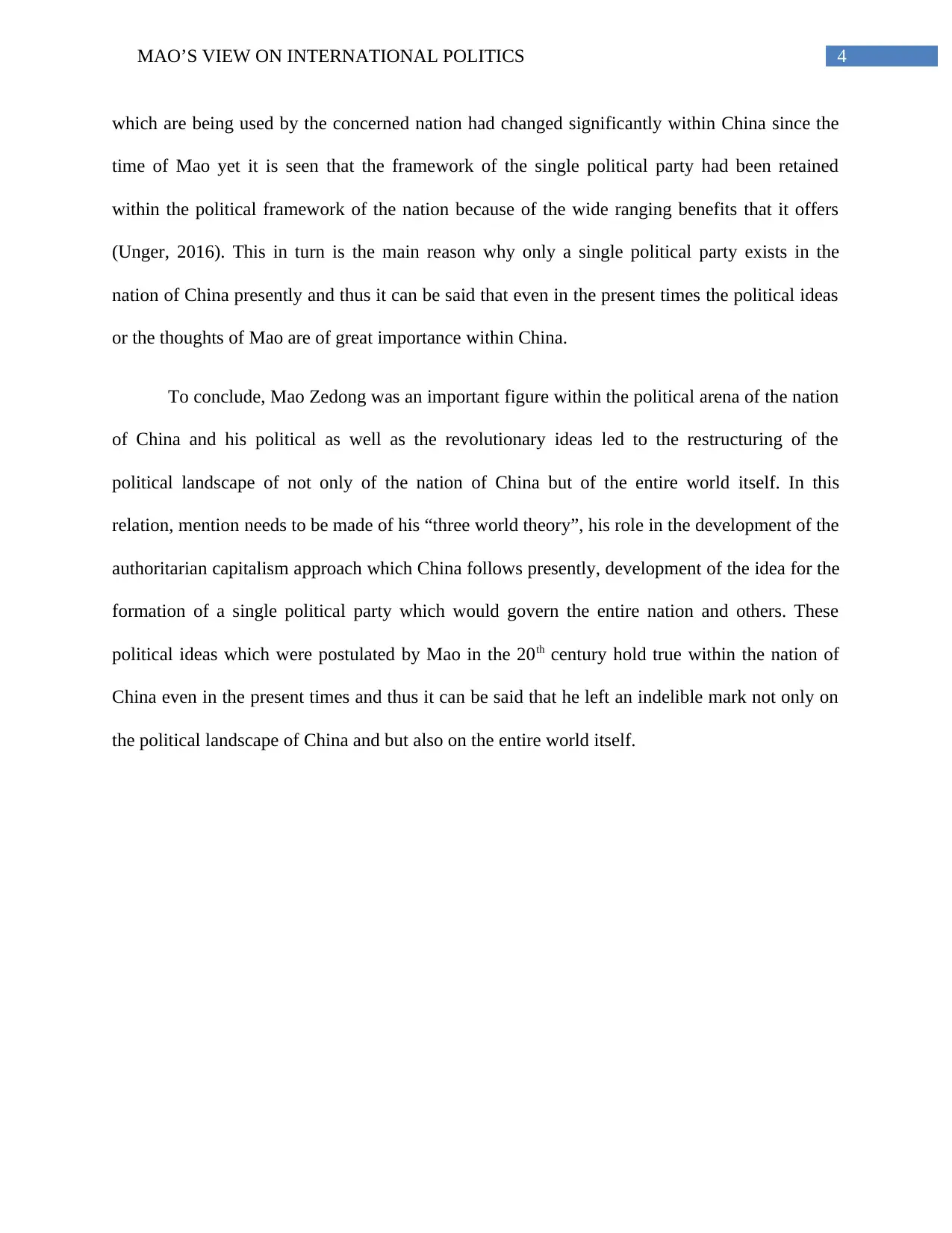
4MAO’S VIEW ON INTERNATIONAL POLITICS
which are being used by the concerned nation had changed significantly within China since the
time of Mao yet it is seen that the framework of the single political party had been retained
within the political framework of the nation because of the wide ranging benefits that it offers
(Unger, 2016). This in turn is the main reason why only a single political party exists in the
nation of China presently and thus it can be said that even in the present times the political ideas
or the thoughts of Mao are of great importance within China.
To conclude, Mao Zedong was an important figure within the political arena of the nation
of China and his political as well as the revolutionary ideas led to the restructuring of the
political landscape of not only of the nation of China but of the entire world itself. In this
relation, mention needs to be made of his “three world theory”, his role in the development of the
authoritarian capitalism approach which China follows presently, development of the idea for the
formation of a single political party which would govern the entire nation and others. These
political ideas which were postulated by Mao in the 20th century hold true within the nation of
China even in the present times and thus it can be said that he left an indelible mark not only on
the political landscape of China and but also on the entire world itself.
which are being used by the concerned nation had changed significantly within China since the
time of Mao yet it is seen that the framework of the single political party had been retained
within the political framework of the nation because of the wide ranging benefits that it offers
(Unger, 2016). This in turn is the main reason why only a single political party exists in the
nation of China presently and thus it can be said that even in the present times the political ideas
or the thoughts of Mao are of great importance within China.
To conclude, Mao Zedong was an important figure within the political arena of the nation
of China and his political as well as the revolutionary ideas led to the restructuring of the
political landscape of not only of the nation of China but of the entire world itself. In this
relation, mention needs to be made of his “three world theory”, his role in the development of the
authoritarian capitalism approach which China follows presently, development of the idea for the
formation of a single political party which would govern the entire nation and others. These
political ideas which were postulated by Mao in the 20th century hold true within the nation of
China even in the present times and thus it can be said that he left an indelible mark not only on
the political landscape of China and but also on the entire world itself.
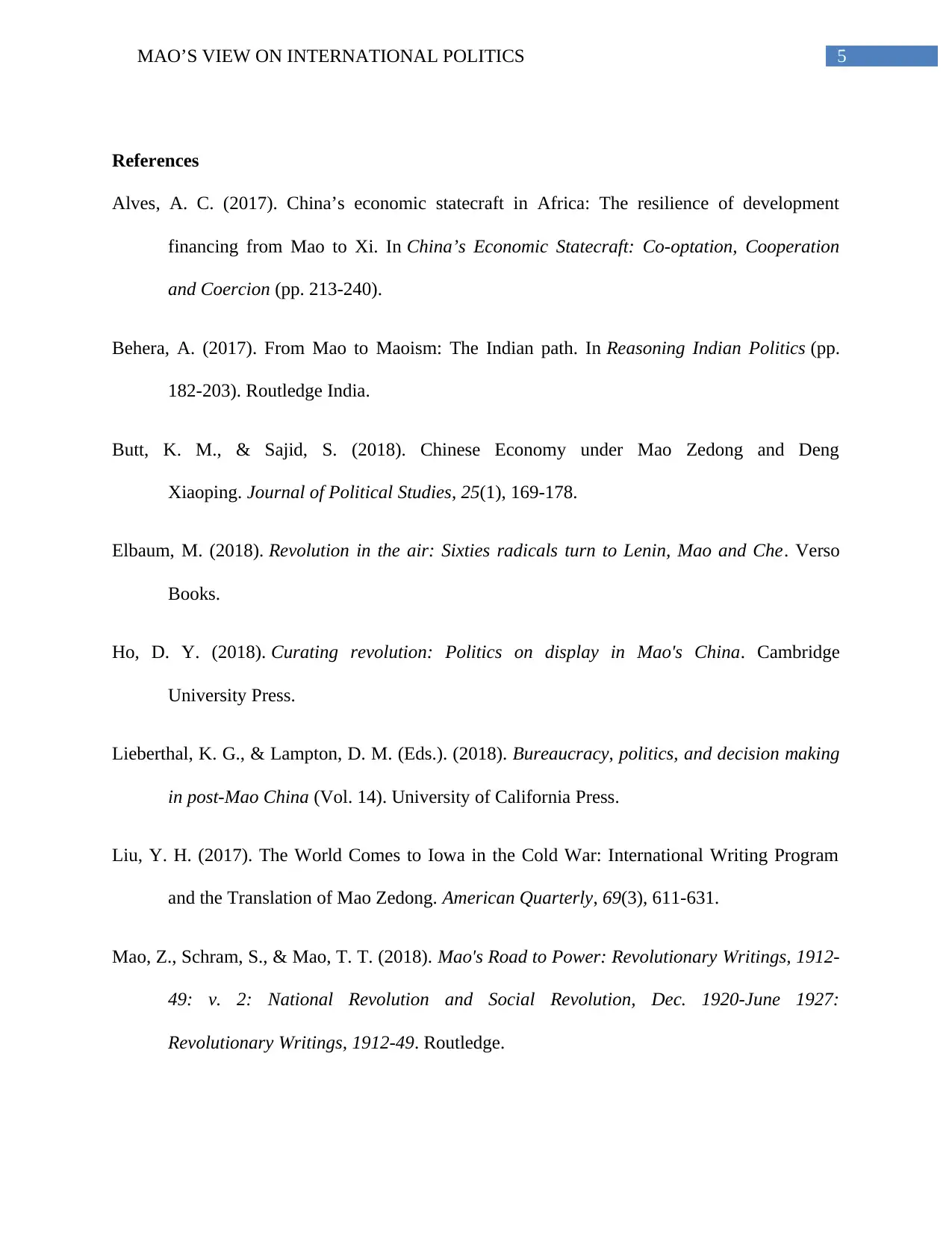
5MAO’S VIEW ON INTERNATIONAL POLITICS
References
Alves, A. C. (2017). China’s economic statecraft in Africa: The resilience of development
financing from Mao to Xi. In China’s Economic Statecraft: Co-optation, Cooperation
and Coercion (pp. 213-240).
Behera, A. (2017). From Mao to Maoism: The Indian path. In Reasoning Indian Politics (pp.
182-203). Routledge India.
Butt, K. M., & Sajid, S. (2018). Chinese Economy under Mao Zedong and Deng
Xiaoping. Journal of Political Studies, 25(1), 169-178.
Elbaum, M. (2018). Revolution in the air: Sixties radicals turn to Lenin, Mao and Che. Verso
Books.
Ho, D. Y. (2018). Curating revolution: Politics on display in Mao's China. Cambridge
University Press.
Lieberthal, K. G., & Lampton, D. M. (Eds.). (2018). Bureaucracy, politics, and decision making
in post-Mao China (Vol. 14). University of California Press.
Liu, Y. H. (2017). The World Comes to Iowa in the Cold War: International Writing Program
and the Translation of Mao Zedong. American Quarterly, 69(3), 611-631.
Mao, Z., Schram, S., & Mao, T. T. (2018). Mao's Road to Power: Revolutionary Writings, 1912-
49: v. 2: National Revolution and Social Revolution, Dec. 1920-June 1927:
Revolutionary Writings, 1912-49. Routledge.
References
Alves, A. C. (2017). China’s economic statecraft in Africa: The resilience of development
financing from Mao to Xi. In China’s Economic Statecraft: Co-optation, Cooperation
and Coercion (pp. 213-240).
Behera, A. (2017). From Mao to Maoism: The Indian path. In Reasoning Indian Politics (pp.
182-203). Routledge India.
Butt, K. M., & Sajid, S. (2018). Chinese Economy under Mao Zedong and Deng
Xiaoping. Journal of Political Studies, 25(1), 169-178.
Elbaum, M. (2018). Revolution in the air: Sixties radicals turn to Lenin, Mao and Che. Verso
Books.
Ho, D. Y. (2018). Curating revolution: Politics on display in Mao's China. Cambridge
University Press.
Lieberthal, K. G., & Lampton, D. M. (Eds.). (2018). Bureaucracy, politics, and decision making
in post-Mao China (Vol. 14). University of California Press.
Liu, Y. H. (2017). The World Comes to Iowa in the Cold War: International Writing Program
and the Translation of Mao Zedong. American Quarterly, 69(3), 611-631.
Mao, Z., Schram, S., & Mao, T. T. (2018). Mao's Road to Power: Revolutionary Writings, 1912-
49: v. 2: National Revolution and Social Revolution, Dec. 1920-June 1927:
Revolutionary Writings, 1912-49. Routledge.
⊘ This is a preview!⊘
Do you want full access?
Subscribe today to unlock all pages.

Trusted by 1+ million students worldwide
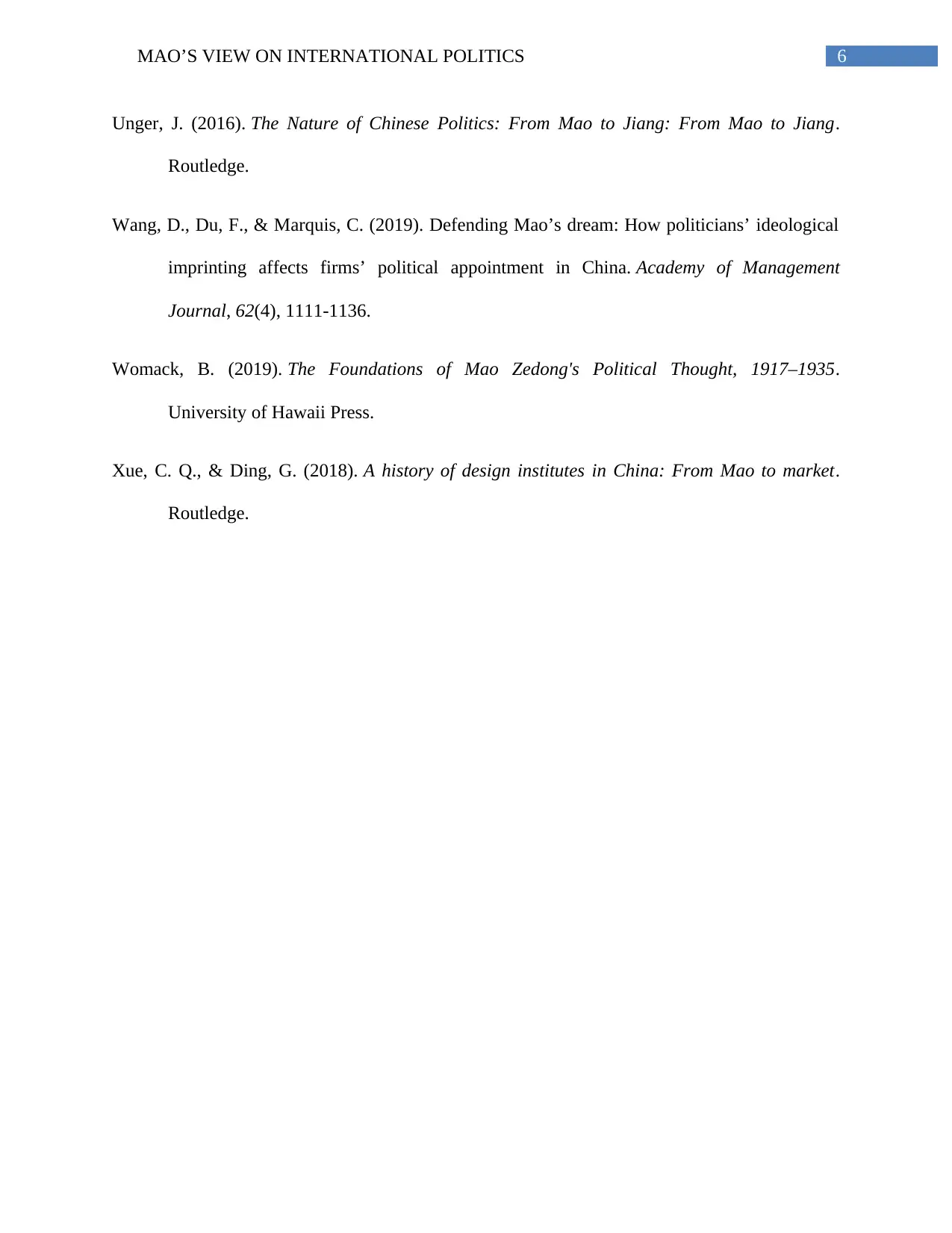
6MAO’S VIEW ON INTERNATIONAL POLITICS
Unger, J. (2016). The Nature of Chinese Politics: From Mao to Jiang: From Mao to Jiang.
Routledge.
Wang, D., Du, F., & Marquis, C. (2019). Defending Mao’s dream: How politicians’ ideological
imprinting affects firms’ political appointment in China. Academy of Management
Journal, 62(4), 1111-1136.
Womack, B. (2019). The Foundations of Mao Zedong's Political Thought, 1917–1935.
University of Hawaii Press.
Xue, C. Q., & Ding, G. (2018). A history of design institutes in China: From Mao to market.
Routledge.
Unger, J. (2016). The Nature of Chinese Politics: From Mao to Jiang: From Mao to Jiang.
Routledge.
Wang, D., Du, F., & Marquis, C. (2019). Defending Mao’s dream: How politicians’ ideological
imprinting affects firms’ political appointment in China. Academy of Management
Journal, 62(4), 1111-1136.
Womack, B. (2019). The Foundations of Mao Zedong's Political Thought, 1917–1935.
University of Hawaii Press.
Xue, C. Q., & Ding, G. (2018). A history of design institutes in China: From Mao to market.
Routledge.
1 out of 7
Your All-in-One AI-Powered Toolkit for Academic Success.
+13062052269
info@desklib.com
Available 24*7 on WhatsApp / Email
![[object Object]](/_next/static/media/star-bottom.7253800d.svg)
Unlock your academic potential
Copyright © 2020–2026 A2Z Services. All Rights Reserved. Developed and managed by ZUCOL.